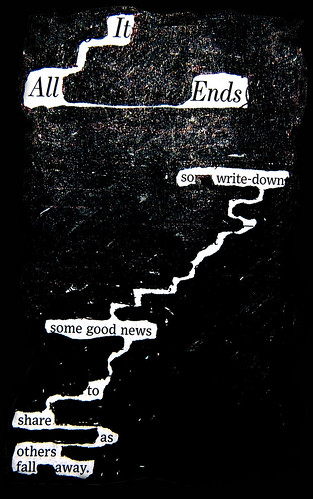What Does the Journalism Crisis Mean for New Media?
Posted in The Gnovis Blog
For the past six weeks, gnovis (and everybody else on the Interwebs) has been a bit preoccupied with the conflict between online media and print journalism – an understandable preoccupation, given the recent closing of the Rocky Mountain News and warning signs from other presses. (The latest buzz even says that San Francisco may soon be without a major newspaper altogether.)
Our coverage & commentary started with Ashley’s allegation that bloggers are parasites living off of “real” journalists (and not respecting symbiotic balance) and Akoto’s discussion of the collapse of the subscription pricing model, then continued with Jason’s fear that the collapse of the 4th Estate will also destroy the integrity of the journalistic profession, echoed a few weeks later by Greg’s anticipatory requiem for former (and future former) journalists.
 I’d like to revisit this theme from a slightly different perspective: What comes next?
I’d like to revisit this theme from a slightly different perspective: What comes next?
No, I’m not wondering whether other papers will follow the lead of the Seattle PI, which this week dropped its print edition and is now online only. Nor am I thinking of yesterday’s episode of NewsHour, in which Dave Hunke of Detroit Free Press talked about his plans for e-papers that are delivered daily at 5:30am, via email (but how will my dog know when to bark at the door?), and Lauren Rich Fine (Kent State U) made the absurd suggestion to seek a “middle ground…some type of a online electronic newspaper, as opposed to a Web site. Why not produce the newspaper online so that I can pull it up, read it page by page in the way that it was meant to be formatted? … I can find the sections in a very predictable manner, and they can deliver it for free.” Fine’s suggestion is, in my opinion, absurd, nostalgic nonsense.
Rather than speculate about how old media can adapt to new media, I’d like to reverse the question and focus on what the collapse of old media will mean for new media. So, let’s assume that the local newspaper industry is going to collapse. There will be survivors, of course – the NYT and other papers with national distribution will survive in print for the foreseeable future, and some papers will find innovative online solutions, and some small town papers with loyal customers may stumble along for a generation. But a lot of medium to large papers will probably go down, their demise accelerated by the hobbled economy.
This will leave a void, obviously, particularly in the area of local and regional political coverage. And that sucks for everyone, both because voids in general are dark and scary and because America has never dealt with this particular void, which makes it even darker and scarier – it’s hard to imagine a world in which news isn’t clearly packaged under institutional mastheads.
However, the news market is, well, a market, and there will be some sort of scramble to fill that void. So let’s look ahead 10 years, and consider which of these two outcomes is more likely:
- Local politicians give press releases to empty press rooms, while unemployed journalists sit at home watching Sienfeld reruns and bloggers continually repost the articles they wrote in 2005, because there’s no journalism for them to cover. -OR-
- Journalists join the blogorati, both to keep up with the times and because bloggers are suddenly desperate for their expertise, and the empty seats in the press rooms are filled by *gasp* bloggers, many of them former institutional journalists.
Which outcome will it be?
Obviously, the answer will probably be a little bit of this and a little bit of that, but I think it’s useful to recall that the doomsday scenarios (the end of print media will be the end of journalism, which will in turn be the end of democracy) rely on the contradictory notion that new media will remain relatively static — that not only are bloggers parasitic today, but they will be tomorrow, even when the host has died. This is silly. True, some bloggers will remain parasitic, but the medium as a whole will adapt, because it will have to.
Journalism will evolve. New media will evolve. Democracy will survive. And there will be much convergence and rejoicing.
Oops. I didn’t mean for this to sound quite so much like a manifesto — but what can I do? I’m just a blogger. What I’m really interested in, though, is what the intelligent and thoughtful readers of this post think. If we drop the doomsday scenarios, what sorts of changes will new media make to fill the void, or what does new media need to do to fill the void?
Photo credit: Mark Larson, “It All Ends“
